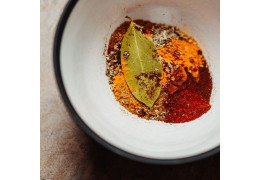
Rosemary: its health benefits
Rosemary is used both in cooking and in phytotherapy. Rosemary is an aromatic plant, but it is also considered to have medicinal properties. Whether infused or used externally, the plant and its essential oils have a wide range of indications. From digestive health and pain relief to memory support, here are just some of the benefits of rosemary.
Rosemary: plant study
Known as Rosmarinus officinalis or Salvia rosmarinus, rosemary is a plant native to the Mediterranean basin. It is a shrub of the Lamiaceae family that can grow up to 2 meters tall. Rosemary has small, green, evergreen leaves that are thin and long. When it blooms in late winter, bluish to violet flowers appear. Thanks to its intense flavor, rosemary is often used in cooking recipes. A honey-bearing plant par excellence, rosemary also produces aromatic honey. But what interests us today are rosemary's medicinal properties. Indeed, the use of rosemary to relieve various ailments has been known since Antiquity. Rosemary already held an important place among the Greco-Roman people. Today, the plant is still used in phytotherapy. Studies on the benefits of rosemary are still limited. However, official bodies recognize the traditional use of rosemary orally, as an infusion, externally or in its essential oil.
Rosemary for digestion
The king of Mediterranean recipes, rosemary contributes to digestive health. This member of the Labiatae family helps relieve digestive problems:
- stomach aches ;
- symptoms of indigestion ;
- excess gas.
Rosemary's beneficial effects can also be seen on the function of the intestinal tract, liver and gall bladder. Now you know what you need to do to relieve heavy digestion: add rosemary leaves to your recipes.
Relieving aches and pains with rosemary
As well as being used to flavour recipes, rosemary is also prescribed in phytotherapy. Rosmarinus officinalis essential oils are particularly effective for external use. Rosemary has anti-inflammatory and analgesic properties. As a result, the plant can be used to relieve a variety of aches and pains:
- headaches ;
- joint pain and rheumatism ;
- muscular tension;
- superficial wounds.
To experience the benefits of rosemary, simply take a few drops of essential oil and massage the painful area. Rosemary's pain-relieving effect can also be seen when used internally. At home, you can prepare an infusion of rosemary leaves. The plant's herbal tea is said to be effective against headaches and pain caused by menstruation.
Herbal medicine: rosemary and memory
Rosemary's benefits also extend to mental disorders. Indeed, the plant's extract is said to improve memory. Rosemary supports the hippocampus, the part of the brain responsible for learning and memorization. Rosemary essential oil boosts concentration and memory. For an invigorating herbal tea, steep rosemary leaves for a few minutes in boiling water. Inhaling the plant's essential oils helps to focus and motivate you.
Using rosemary for its draining effect
In phytotherapy, rosemary is recognized as a diuretic and depurative. It promotes water elimination by stimulating the urinary system. This reduces the risk of urinary calculi. Rosemary also cares for your liver and gall bladder. Orally, the plant's leaves stimulate the secretion of digestive juices.
Active ingredients of Rosmarinus officinalis
To better understand the health benefits of rosemary, we need to look at its composition. Like most medicinal plants, rosemary contains antioxidants and essential oils with beneficial effects on the body.
- Rosmarinic acid is a powerful antioxidant found in plants of the Labiatae family. Studies are even looking into its effects on prostate and breast cancer prevention.
- Triterpenes, such as oleanolic acid, have analgesic properties to relieve pain and inflammation.
- Rosemary's various polyphenols protect cells. These molecules, like carnosic acid, offer antioxidant effects and preserve health.
- Depending on the medicinal plants used and how they are distilled, there are three different rosemary essential oils: cineole-dominant, camphor-dominant and verbenone-dominant. Each oil is used for its own specific indications.
How to benefit from the virtues of rosemary at home?
Incorporate the benefits of rosemary into your cooking recipes to benefit the whole family. Fresh or dried, rosemary leaves can replace or accompany spices. They can be used to flavour sauces, gratins and grilled dishes. The plant can also be enjoyed as an infusion or decoction. To prepare an herbal tea, immerse a few grams of rosemary leaves in boiling water and leave to infuse for ten minutes. Inhaling rosemary essences, swallowing the tea or applying it externally can relieve a variety of ailments. For example, you can improve concentration, soothe digestive problems and other aches and pains. As for rosemary essential oil, its indications are numerous. It can be applied externally, orally or inhaled. Use essential oils with care, respecting the number of drops indicated. Some oils are neurotoxic or allergenic, so ask a health professional for advice. Rosemary is also available in other forms: capsules, macerate, extract, topical medication, etc. Want to enjoy the benefits of rosemary in infusion? Try our rosemary, thyme and lemon herbal tea.





